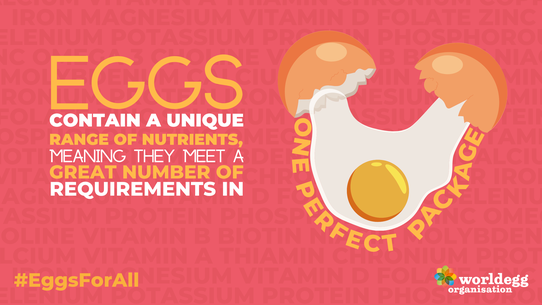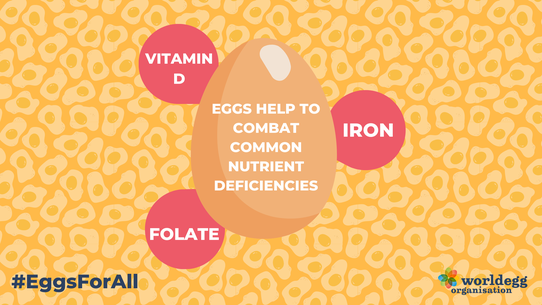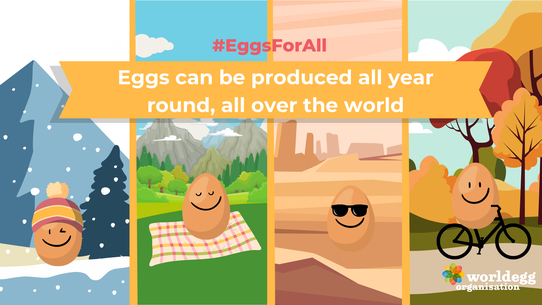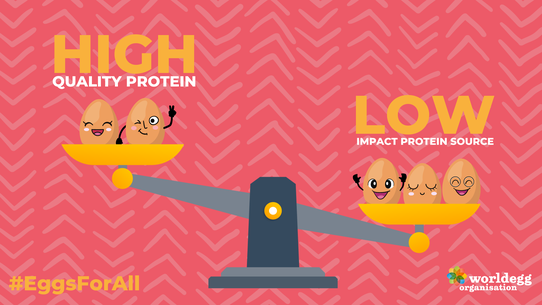3 unbeatable reasons to choose eggs this World Health Day!
World Health Day 2023 marks the 75th anniversary of the World Health Organisation (WHO). This year is an ideal occasion to reflect on the improved quality of life over the last 75 years due to public health successes. It is also an opportunity to inspire action to tackle current health challenges and take critical steps towards a healthy future for all.
The egg is a widely accessible food source, packed with essential nutrients and high-quality protein. This versatile and powerful package can continue to directly improve human health outcomes around the world, while also protecting our planet.
Discover three incredible reasons eggs are a healthy choice for all this World Health Day.
1. Vital for human health
As nature’s superfood, eggs contain a huge range of nutrients, essential for a healthy, balanced diet. Eggs are more than just a simple snack; one large egg contains 13 essential vitamins and 6g of protein, contributing to good health throughout your lifetime, from infancy to old age!
Protein is necessary for effective muscle growth, recovery, and maintenance, and eggs contain all 9 amino acids making them a complete or high-quality protein1.
Studies have shown that eggs can play a key role in reducing malnutrition and protein poverty in vulnerable groups such as pregnant women and children. For example, one study found that eggs reduced stunting in children by 47%2. This is pivotal for low- and middle-income communities who rely on affordable and accessible food sources for nutrition.
Furthermore, thanks to their soft texture and easy digestibility, eggs have been proven to reduce chances of sarcopenia – the loss of skeletal muscle mass as a result of ageing3.
In addition to being a high-quality protein source, eggs are also a great source of commonly deficient but essential micronutrients such as, choline, vitamin A and vitamin D4.
Just two eggs provide 82% of daily vitamin D requirements, 50% of daily folate requirements and 40% of daily selenium requirements1, making them nutritionally plentiful, with significantly lower environmental and price costs than other animal-protein food sources5.
2. Accessible for all
Eggs are widely accessible as they can be produced all year round, all over the world! However, the industry is always taking steps to make eggs even more accessible in areas where consumption is low.
The International Egg Foundation (IEF) was established to create an independent and sustainable food supply by developing local knowledge, expertise and entrepreneurship in protein deficient populations, increasing the consumption and local production of high-quality protein through eggs.
1 in 6 people around the world rely on agriculture for their livelihoods, making it a lifeline for many rural communities. The IEF provides training courses for egg farmers in low-income regions, empowering them to establish self-sufficient sources of powerful nutrition to feed their families and communities, and improve their overall health6.
In addition, the charity also supports intervention feeding programmes, distributing egg protein to infants and children in areas of nutritional need. With the support of scientific entrepreneur, Dr Fabien De Meester, the IEF has established a method to keep eggs fresher for longer without refrigeration, aiding accessibility to communities worldwide, particularly those in low- and middle-income countries.
3. Sustainable source of protein
Not only are they a high-quality protein, they are also low impact protein source. In fact, eggs have the lowest greenhouse gas (GHG) emissions per gram of protein when compared to other common animal protein sources7 – therefore, supporting planetary AND human health.
Additionally, per gram of protein, egg production requires up to 85% less water than other animal-protein sources8.
Moreover, egg businesses around the world are committed to finding new methods of producing eggs in environmentally sustainable ways. For example, a Netherlands-based egg producer has developed their business around carbon neutrality, animal welfare, and using surplus food for animal feed9. Meanwhile, in Canada, the country’s first net-zero farm has been successfully producing eggs since 2016, with multiple similar barns now in operation10.
All-round goodness!
As an affordable, accessible, and sustainable food source, eggs can play an important role for everyone, worldwide, acting as a catalyst for a healthier future for all of us.
This World Health Day, join us in celebrating how the egg can contribute to eradicating malnutrition worldwide in an environmentally sustainable way!
References
2 Washington University in St Louis (2017)
3 M. J. Puglisi and M. L. Fernandez (2022)
4 Y. Papanikolaou and V. L. Fulgoni (2020)
5 S. Walker and J. I. Baum (2022)
6 International Egg Foundation (2022)
7 World Resources Institute (2016)
8 M. M. Mekonnen and A. Y. Hoekstra (2010)
10 Egg Farmers of Canada (2020)
Celebrate the incredible egg!
The IEC has developed a social media toolkit to help you celebrate World Health Day 2023 with eggs. The toolkit includes specially made sample graphics, video and post suggestions for Instagram, Facebook and Twitter, all ready to be downloaded and shared!
Download the World Health Day toolkit (English)
Download the World Health Day toolkit (Spanish)



